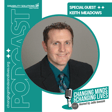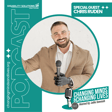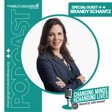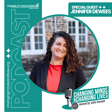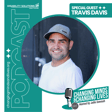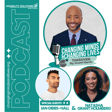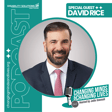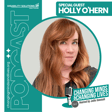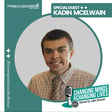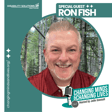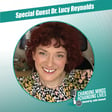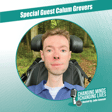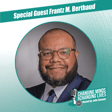Become a Creator today!Start creating today - Share your story with the world!
Start for free
00:00:00
00:00:01

CMCL Interview: Grant Harris
In this episode of Changing Minds & Changing Lives, Grant Harris opens up to Julie about his late-life autism diagnosis, sharing his journey of understanding and accepting his neurodistinct behaviors. He discusses the impact of his diagnosis on both his personal life and professional endeavors, particularly through his consulting firm, GTH Consulting. The conversation also explores the importance of neurodiversity in the workplace and how fostering an inclusive environment can benefit organizations. Grant’s candid insights offer valuable perspectives on embracing differences and the challenges and rewards that come with neurodiversity.
Transcript
Introduction and Leadership Transition
00:00:00
Speaker
Right. Welcome to Changing Minds, Changing Lives, kicking off our 2025. I am so excited to be here. So excited to be back.
00:00:12
Speaker
So energized right now with everything that's happening in the world and And before we bring on our amazing guest this week, Grant Harris, so I'm so excited to introduce all of you or potentially reintroduce all of you too.
00:00:31
Speaker
I just want to take a couple minutes and talk about my transition, my successor, um why I chose to move into a new role with Disability Solutions and what you all can expect from me and from the team in 2025.
00:00:50
Speaker
So I guess I hopped right in, didn't I? So welcome to Changing Minds, Changing Lives. My name is Julie Sowash. i am no longer the executive director of Disability Solutions, but as of January, I stepped into a new role with the team um as founder and strategic advisor, um which is really, really exciting for me. um And as a part of that, really the best part probably is that unlike so many other leaders, I had the opportunity to, to
00:01:26
Speaker
choose who takes this mission forward with Disability Solutions. And when Keith Meadows, my longtime number two, agreed to step into the role as the executive director, I could not have been more thrilled.
00:01:41
Speaker
um Keith is so dedicated to the work. He's so dedicated to the team. Since I stepped into the executive director role almost seven years ago now, i knew there was no one that could step into this role if I ever chose to go on to my next adventure other than Keith.
00:02:00
Speaker
So I want to thank him and thank the team for the incredible work that they've done to support me through my transition and then kind of leaving my baby. And, you know, with that, i I do also just want to take a couple of minutes to talk about why I chose to leave now um and kind of address any perceptions or optics due to the timing. So i decided that it was time for me to move away from disability solutions full time about nine months ago.
00:02:37
Speaker
And really the planning process started at that point. um And it is purely because I am in a different place in my life. Our kids are grown. Chad and I, if you know us personally, know that we travel all the time.
00:02:52
Speaker
And what I wanted to do is be able to take full advantage of that, grow into our own business that's been around Catch-22 for the last 12 years and really step into a full-time CEO role there, as well as with our acquisition of the JobWord Doctor, for me to spread my wings um into some other areas of talent acquisition where I can make an impact, um as well as just kind of provide me the work-life balance that I was looking for.
00:03:20
Speaker
I think it's important for everyone to know that this was not a post-election decision. This was not a post-11-246 revocation decision.
00:03:33
Speaker
It's bad timing, but it was all timing that has has started for me well into early 2024.
Introducing Grant Harris and Neurodiversity
00:03:40
Speaker
um And I want you guys to know that even though I'm not in the ED role anymore, I'm still going to be doing this amazing podcast. And we are so excited about the new guests that we're going to bring on this year um and some returning guests who we're have great conversations with.
00:03:57
Speaker
We're going to really ramp it up in 2025. We need to hear more disabled voices um in our community. We need to hear the incredible work that we are all continuing to do.
00:04:10
Speaker
when it's not so easy, when it gets dramatically harder. And and we've been through a lot in my 15 years and we've seen some great progress.
00:04:22
Speaker
um and And like I always say, this is a lifetime's worth of work. So we're going to see ebbs and flows on our progress. And what is so exciting is that when times get harder, we see who really is in our corner. We see who's committed to the work and we see who is just performative in the work.
00:04:43
Speaker
And we rally those people next to us. We rally those people and we bring them in because we get to continue to do this great work. We get to continue to do this, this ah good trouble, so to speak.
00:04:56
Speaker
And with that, i want to introduce this week's guest, Grant Harris, who's coming onto the show. Grant is the ah CEO and founder of, excuse me, GTH Consulting. He's a neurodiversity champion. He is an autistic author, not one, not two, but three times.
00:05:20
Speaker
He's a DEIA practitioner, board member, and he helps move organizations from compliance to community, a mission that is very aligned with what we do at Disability Solutions, which is Changing Minds and Changing Lives, the name of this podcast.
00:05:36
Speaker
And Grant is helping companies and leaders understand that we need to move from the they're now gone stick to understanding the real value and just incredible talent that people with disabilities bring into the workforce and into our lives.
00:05:55
Speaker
And he also, and I want to talk about this a little bit later, and then I'm going to let Grant do his introduction. He also has a peer group that is focused on helping Black neurodistinct professionals maximize manhood in their workplace.
00:06:11
Speaker
I love that title and I want to talk a little bit more about what that means. But first, let me stop talking and welcome the most important person in this session to the podcast. Grant, thank you so much for joining us.
00:06:26
Speaker
Oh, thank you, Julie. All I can say to that commentary is is wow. I appreciate you and your continued effort over the years and ah Transition is always hard Change management is never easy.
00:06:44
Speaker
But I appreciate the opportunity to come here to speak with you and address your audience. It's very humbling ah because of the things that you've been able to accomplish and the things that you will be accomplishing in your future.
00:06:58
Speaker
So thank you for allowing me to be here for a
Personal Challenges and Neurodiverse Management
00:07:01
Speaker
few minutes. Yeah, I'm absolutely I'm honored to have you on the show. I've been following you on LinkedIn for, i would say, at least a couple of years, maybe a little bit longer.
00:07:12
Speaker
um and i was so excited when Ashley was able to get you to agree to come on the show. um ah First, for for our listeners who don't know you, guests who don't or watchers who don't know you.
00:07:24
Speaker
Tell me who is Grant Harris? um How did you get into this work? And just sort of, I'll say your blue sky um bio, some personal things about you as well. Yeah, for those of you who don't know me, my name is Grant Harris.
00:07:39
Speaker
I am founder of GTH Consulting, which is a management consulting operation that offers customized organizational development services.
00:07:50
Speaker
ah human capital management, and cultural transformation to both public and private clients over the years. Ultimately, as you mentioned before, my goal is to help individuals and institutions achieve a new level of organizational excellence and to move from what I call compliance to community.
00:08:11
Speaker
ah That is is my tagline, and compliance is ah is a fixed mindset. Things happen because they've always been that way, the traditionalist way of thinking, the linear way of thinking and being and doing and move to ah community, which is a set of of behaviors. And it those behaviors start with an internal ah realization and recognition of who you are and where you are as a leader and as an employee in the workplace um and through a transition
00:08:43
Speaker
um to Understanding that the work that people do is not in vain and the work that disabled people and specifically neuro neurodivergent people bring to the workplace is valuable and honorable, just like any other part of work.
00:09:04
Speaker
So I hope people understand these concepts and break them down and give action steps. and then support them ah through that journey because it is a journey and none of us are at the end of our journey. You are one place and I'm in another, but we're all on that path.
00:09:21
Speaker
So that's from the the corporate level. But from a personal perspective, I happen to be a person with a disability. I was diagnosed autistic coming up on three years ago.
00:09:34
Speaker
ah And i have my wife to thank for that. ah You mentioned who who might be in my my life that I could point to it's to to say, well, this person certainly had an effect on me.
00:09:47
Speaker
Obviously, my wife has an effect on me, but I probably wouldn't be aware of my autism if it hadn't been for her. um And she sent me a listicle one day of 10 things about your spouse or your ah significant other that that might be a autistic.
00:10:02
Speaker
And I resonated with like eight of them kind of right away. So I was like, wow, this might be me. And at that time i had been I had taught autistic kids as a special educator.
00:10:13
Speaker
i had been around ah neurodiversity, hadn't studied it, hadn't looked at myself as disabled or neurodistinct in any way, shape or form. But thanks to that interaction that spurred knowledge about myself and understanding of who I am.
00:10:31
Speaker
and where I am on my journey and the work that I do. oh So that's a ah bit of of the background. I'm the first and only person in my family to be diagnosed ah with a disability and specifically with autism that I'm aware of.
00:10:51
Speaker
um So it's a bit isolating. ah my My wife is ADHD. My oldest daughter has some executive functioning challenges. um So it's not new within my household. My wife is long time medicated um and we can talk about the ins and outs and the differences of an autistic person being married to an ADHD person.
00:11:11
Speaker
oh And it's a fun time. But, yeah, that's that's a little bit about me in terms of from the corporate perspective and also from the the personal perspective. But very much looking forward to to digging deeper on any of those topics.
00:11:26
Speaker
Yeah, that's that's amazing. Thank you for sharing that. um And I didn't know that you were only diagnosed three years ago. So tell me how, and and if I overstep any place, just tell me to to go fly a kite. I'm not easily offended.
00:11:43
Speaker
How... how how has that this three years of processing been for you in terms of, i would say, recognizing, um, in yourself, certain behaviors that are related to your autism and how you, um,
00:12:01
Speaker
found that information to be useful in how you function and move in the world. And and I would be interested at ah as a wife with ADHD and some other anxiety disabilities about a little bit more about that interaction with your wife. I think ah my husband who is not autistic could probably use your notes anyway.
00:12:22
Speaker
Yeah. ah So at that point in time of my life, might I did not grow up with an understanding of disability. It wasn't a thing in my household. My parents didn't talk about it.
00:12:34
Speaker
None of us were visually disabled in any way, shape or form. ah From that perspective, we were all able-bodied. But again, that's the external and what you can see.
00:12:46
Speaker
i had no idea about the internal. So I was late diagnosed. And as you know, and maybe most of your audience will know, In this country, in the US, most people are diagnosed with autism by the age of six.
00:13:00
Speaker
And that was not the case for me. um i was a grown man. I had a life of experiences and a life of masking, which I did not know that I was masking. um And my wife and I were having communication struggles at the time as a husband and wife who do. But it was like deeper than just the the surface surface level, deeper, deeper than just the daily grind Um, so we had to dig deeper and look at things. And my wife had a inclination.
00:13:29
Speaker
And like I said, she sent me the text. And at that point, uh, I had a recognition. I have always been open to, ah like going to the doctor and being healthy from that perspective. I never had a ah bias against learning more about myself from medical perspective.
00:13:46
Speaker
So i said, okay, well, let's get tested. I was all for that. I had taught autistic kids. I had been around with kids with IEPs and I'm sure that helped with that awareness and recognition.
00:13:59
Speaker
But I was very interested to to learn more about myself, which goes to some of my autistic nature. am a lifelong learner and my brain, according to everything that every everyone tells me anecdotally and according to my medical diagnosis, my brain absorbs information faster than the average bear.
00:14:21
Speaker
So my brain is always computing and I'm always thinking about my thinking. And it literally feels like a sponge. Teddy Roosevelt, great president. ah If you're not familiar, he always he was a hard charger moving forward all the time.
00:14:36
Speaker
He literally said if he wasn't moving forward, if he wasn't accomplishing, ah he felt like he was going to die because his heart was just always like beating out of his chest. this this just this go, go, go just doing something.
00:14:48
Speaker
And that's how my brain kind of operates. I'm always looking for the next bit of information. um i taught myself how speed read. i listen to videos. Playback speed is is spit is sped up because my brain listens faster than most people speak.
00:15:08
Speaker
When I watch Jeopardy, which is one of my favorite shows, I answer the question it's finished being read because I'm moving faster. And I'm absorbing information. And as soon as I get something in, which is great, I'm like ready for the next day.
00:15:24
Speaker
And while that's a blessing, it's also a curse. Because I feel like ah that I'm always looking for the next thing. I'm always seeking the next thing. My brain is like always feed me more. And I have to kind of tamper that and say, OK, I get it. And in fine ways, both anecdotally and both directly to alleviate that sometimes.
00:15:50
Speaker
So that's part of how my autism shows up. That is helpful in terms of helping other people because other people either feel the same way or they're nonlinear in terms of how they see information and how they absorb it.
00:16:07
Speaker
And that's a differentiator that I have used to be, quote unquote, successful in life. I didn't know that up until a couple of years ago.
00:16:20
Speaker
ah So I spent the first year recognizing and coming to um a realization of of being a disabled person. I was always good with the label of autism because, again, I taught autistic kids. I never saw it as a bad thing. I still don't. I think it's pretty cool.
00:16:38
Speaker
I wear it on my sleeve. I'm proud about it. I'm here talking to you about it. I do lots of these interviews and conversations. However, the the biggest thing that I still struggle with, um because my as much as there is positive about my particular way that autism shows up for me, it's also difficult.
00:17:01
Speaker
I am very routine based and it's difficult sometimes for me to accept changes in a schedule and unknown things that I can't see coming in these types of things. And now that I have a better awareness, I react to them differently.
00:17:15
Speaker
But for a very long time, it was a it was a poor reaction based on other people's feedback. So the biggest thing that I struggle with now is not being autistic or not transitioning from from conversations or not um having difficulty in social environments and not really wanting to be around people.
00:17:37
Speaker
ah Those are difficult, but that's not the biggest thing for me.
Societal Biases and Mindset Changes
00:17:40
Speaker
The biggest thing for me is that my wife, who's ADHD and also disabled from that perspective, ah She can take a pill and she can look better and feel better and act better and do better and quote unquote be better.
00:17:53
Speaker
She can be a not a different person, but an enhanced version of herself. and She gets that support. I and all of my autistic brothers and sisters, ah we don't have a magic pill that we can just take and swallow and All of a sudden, we're better with transitions or all of a sudden I can shut my brain off or all of a sudden i am not routine based and don't need ah timers and ah notifications to to do things on a set schedule that like that doesn't happen for us.
00:18:30
Speaker
So we just have to work and I have to work at my communication. i have to ah find different ways and means that the way that I operate can be acceptable to others around me.
00:18:43
Speaker
And then when it fails, I just have to try again and try a different way. I'm not saying that people with ADHD don't, of course, because they're people and they're humans, but they have the option to be medicated, which my wife has taken that option.
00:18:58
Speaker
um And they have that support system, which I do not. So that's the biggest. ah The biggest obstacle that I still battle with mentally is that I just have to work on myself and through myself without.
00:19:17
Speaker
A medical support from that perspective that clearly helps other people with their ah type of neuro distinction. Yeah. Wow. Yeah, that's some.
00:19:28
Speaker
just given me so much to think about. So thank you for that. And again, thank you for the transparency. and And to your point, I was late diagnosed ADHD and it saved my life and it dramatically changed my life because I didn't understand what was wrong until the I got that that diagnosis and I didn't have any idea how to control what was happening in my brain. And I do take medication. And if I went off medication when I have in the past, it's not been a pretty day.
00:20:01
Speaker
um And so I think that you make a really good point that is often overlooked. We all have our own journey with disability, whatever our disability is.
00:20:14
Speaker
But it's so helpful, I think, for our listeners to understand that while you recognize and appreciate that your wife's brain also functions different differently, um and that can be both good and bad, that you your journey is much different than hers, just because we're both neurodiverse, neurodistinct,
00:20:40
Speaker
that journey is still very different from your perspective versus her perspective. And I would say, you know, even my perspective, because we are all living individual lives.
00:20:52
Speaker
Yes. And I would say a couple of things I want to I know we're just meeting for the first time and having this conversation, but we're real. And I always try to recognize my own ah bias And I used words and phrases like blessing and a curse.
00:21:08
Speaker
and You use words and phrases like good and bad um and that something was wrong and we live it and we're here and I have to catch myself because I spend my time as you do.
00:21:21
Speaker
helping educate other people about the fact that it's not bad or wrong or it's not a curse. It just is. Because like I like to say, we are all distinct human beings and we all deserve to live a life full of distinction, which is why i identify as being neurodistinct versus neurodivergent.
00:21:40
Speaker
oh But I have to hold myself to that same standard. So the fact that my brain is always absorbing, you know, I said it was a blessing and a curse. It's it's a blessing and it's an obstacle sometimes, but it's not a curse. And I heard you say that, you know, it's not a pretty day and you had to find out what was wrong with you.
00:21:59
Speaker
And obviously, you know, nothing was wrong with you. it was just different and nonlinear and wasn't traditional. And these are things that when I hear other people, I can easily pick them up and say, hey, well, let's reframe that conversation.
00:22:13
Speaker
But I have to remind myself to do that. yeah And so thank you for giving me the opportunity to remind myself. And thank you for being open to that feedback of this is what I heard you say. But from one neurodistinct person to the other, there are certainly and for all of your listeners who either are undiagnosed because they can't afford it or are ah or self-diagnosed because they choose to be.
00:22:40
Speaker
or who are medically diagnosed because ah they were forced to be whatever your situation is. um You are not cursed. I am not cursed. Julie's not cursed.
00:22:53
Speaker
There's nothing wrong with us. What's wrong is that everyone else thinks that something is wrong with us. And that's not the case. We just are And it is a blessing that we operate differently. And sometimes it's hard to see that blessing like you.
00:23:10
Speaker
mentioned it's not a pretty day and it's difficult to see the blessing from that. And for me, sometimes it's hard to see like I'm doing all this work internally and I feel like that I've made progress. But then people around me are still like, oh, you're still doing the same thing you were three years ago or 10 years ago before I knew.
00:23:31
Speaker
So I just wanted to bring that up because I talk about bias in my day to day. But none of us are immune from it.
00:23:42
Speaker
Bias and and ah even in and of itself is not bad, but not recognizing it, not being aware of it, and then not expressing it and moving to the left or right of it. That's the bad part.
00:23:56
Speaker
So forgive me for digressing, but just wanted to make that point. Yeah, no, I think that's an excellent point. And it's, you know, before we started recording, I asked you like,
00:24:08
Speaker
If I say something that you don't like or something that um you want to reframe, do it. um and i And that's why we want to have these conversations. and And, you know, it's true that people who have brains that function differently, whether that's mental illness, neurodiversity, neurodistinction, of wherever you sort of sit in that and that spectrum, are more ashamed of their disability than people with physical disabilities and very apparent disabilities because we've been taught that You can go to the doctor going back to your earlier point. You can go to the doctor and you can fix a broken leg or a strained muscle or XYZ and we were taught as as children. I know I'm a ah little bit more senior than you are but we were taught that
00:25:05
Speaker
and especially growing up in a very religious house that I needed to just sort of pull myself out of the out of the gutter, ask Jesus to help me and be better. And I was taught that there was something wrong with me.
00:25:18
Speaker
And I even, after all of these years of work and knowing that I've been a person who's lived with with a disability for a, since my early twenties, maybe my late teens still fall back into those habits of my own bias about what I should be able to do to fix myself rather than to recognize that this is something that is neurologically different.
00:25:50
Speaker
And there are It's most certainly blessings um and and things that are especially on the business side that make me really, really good at what I do and make you really good at what you do.
00:26:03
Speaker
But we still beat ourselves up over the quote unquote bad days. or the feelings of bad. And i a I want to say just thank you for that because I needed that today.
00:26:14
Speaker
um I needed that reminder and it's going to be great listening for other people in our world who don't have the same privileges that we do to be able to speak about who we are to remind them of that.
00:26:26
Speaker
Yes, certainly. And that reminds me of and you mentioned, you know, doing the work ourselves and trying to change ourselves and be quote unquote better.
00:26:40
Speaker
ah um want to recognize and I have to her directly my wife, my family, um my nuclear family growing up.
00:26:52
Speaker
They weren't fully understanding of me being autistic. They labeled it other things. They thought it was attributed to other experiences in my life.
00:27:03
Speaker
um they're much more understanding now. My wife just thought that I was an ass. She thought I was an asshole. And she thought that i thought that I was better than other people because in social situations, I was the quiet one and I was standoffish. And in American culture, say, oh, got always got watch out for the quiet ones.
00:27:28
Speaker
And I question myself. all of those, you know, idioms and traditional thoughts in American culture, are like, why do you have to watch out for the quiet ones? I'm watching out everybody else that's loud and brash and all of that.
00:27:46
Speaker
But inherently, we're taught that the quiet ones are hiding something or that they're nefarious or that you got to watch out for them because you can't read them.
00:27:57
Speaker
And I'm like, no, I just... don't feel like fighting for space in his room of a lot of people. um And then therefore I'm the one that looks like I'm arrogant.
00:28:09
Speaker
um The fact that i absorb so much information I used to, my family makes fun of me for it. Now I used to have these things called interesting facts because I like to tell people that I know a lot, excuse me, I know a little about a lot.
00:28:26
Speaker
um i certainly do not know everything but i know a little about a lot and that's because i'm always reading something listening to something absorbing something in my brain watching jeopardy these kind of things and then when something happens in the day i'm like oh julia i got an interesting fact about that and an interesting fact people got tired of hearing my interesting facts because it made them feel that somehow i was superior or they were inferior And I just thought that I was sharing knowledge and be like, hey, I know this and you should know this, too.
00:28:58
Speaker
so mindies are Yeah. these these are these are the quirks. And now um that's the case in point of me adjusting because I'm grown and I see much more gray now. It used to be very black or white for me for most of my life.
00:29:13
Speaker
Marriage and three kids and all that will will build gray in your in your life. um But now instead of like interesting facts, I say, well, what did you know? And it's the same kind of concept that I'm sharing this information that I find interesting, but I'm doing it in a different way that's more digestible to the people who love me.
00:29:35
Speaker
So that's that's an example of not changing who I am because of my autism, but adjusting and making a simple adjustment. We talk about simple adjustments in the workplace all the time. Simple from an accommodation standpoint.
00:29:51
Speaker
You can have formal accommodations or you can have simple adjustments. And in life, it's the same thing. Simple adjustment. I'm not withholding the fact that I have this information and I want to share it with you because I love you and I think you should know.
00:30:05
Speaker
But I'm adjusting the way that I give it so that it's more digestible to you. Fortunately, I'm able to do that because i have low support needs.
00:30:15
Speaker
oh Unfortunately, for those of us who have higher support needs, they are maybe not able to make that adjustment. And then it's up to others around them to have that empathy, not sympathy, um because no disabled person wants to be felt sorry for, um but have the empathy.
Consulting Framework and Community Support
00:30:38
Speaker
say okay well they may not have the capacity to do this at this point in time in life at this point in time in their career but they can't do this and let me meet them halfway and i don't see that a lot in the workplace in the workplace it's the disabled person has to meet the standard 100 of the way and the standard and the tradition and the leader or the hiring manager or the supervisor doesn't meet them halfway and unbeknownst to that leader, supervisor, manager, they are probably neurodistinct themselves because upwards of 40% of the workplace is neurodistinct. That identifies as such and that is aware as such.
00:31:23
Speaker
So it this plays across both senses from a ah life and at home perspective and also in the workplace. I spend much of my work much of my work talking about the workplace.
00:31:36
Speaker
But we leave that workplace and we go home and we leave home and we go to that workplace and it intersects. All of that intersects. So um I'm rambling, but I appreciate ah you taking us down that path.
00:31:51
Speaker
Yeah, no, I appreciate you you. You have actually led me down the correct path because I want i I would love to just talk to you about personal things all day. That's like, you know, we get such candor.
00:32:02
Speaker
um and in some of our guests, and I really, really appreciate that. But I do want to know more about what you do at GTH and how you roll your your lived experience and the lived experiences of of others in your neurodistinct sphere um into the work that you do to help with you know workforce development, optimization, all of those things that are ah talent acquisition buzzwords that we're all very excited about and we all want to do as as good leaders.
00:32:42
Speaker
um how How does that impact what you do at GTH and how do you help companies um ah recognize what they need to do in workforce development, how they get to optimization and how that also includes talent with disabilities?
00:32:57
Speaker
Yeah, thanks for asking. So, so many things. It's all about education and and learning. And as the late great Maya Angelou used to say, when you know better, then you can do better.
00:33:10
Speaker
So my approach is holistic from the standpoint of I don't tell organizational leaders that they're doing something wrong. I help organizational leaders through the race framework that I created. Race is an acronym, RACE.
00:33:24
Speaker
I help them understand who and who they are and where they are on that journey. I help them to acknowledge their intent and their impact. help them to cultivate tools and resources and I help them engage in that work. And this is a cyclical process. so recognition, recognize, acknowledge, cultivate and engage.
00:33:49
Speaker
So this is what we talk about. These are things that we do. um So looking at their policies, practices and their procedures, not only from a 30,000 foot level, but also from a granular level to understand how they can be more neuro inclusive.
00:34:06
Speaker
So it's not about let's throw out everything that you're doing. It's more about let's refine what you're doing. And then let me introduce you to something you may not be doing in order to do two things one be more neuro-inclusive for the workforce that you have now because like i mentioned before 30 to 40 percent of the workforce identifies neurodistinct however uh 70 60 to 70 percent of that percentage uh feels like that they are discriminated against uh they are afraid to disclose um they have a negative stigma uh within that workplace and that's a significant portion
00:34:45
Speaker
So helping organizations understand that the more neuro-inclusive ah that their workplace is, because neurodiversity touches all of us, what I like to call from the boardroom to the mailroom.
00:34:56
Speaker
ah So there's a there's a thought that because I'm not autistic as a as a person, I'm not autistic, ah dyslexic or and I don't have ADHD that then therefore I don't need to care about neurodiversity because it's not me. One, there are dozens of different forms of neurodivergence, not just the most common three that we hear about.
00:35:17
Speaker
And two, everyone is neurodiverse because we all have a brain that operates differently. There's this neurotypical, and this is part of the education, i don't want to get too much in the weeds, but it's part of the education between neurodiverse, neurotypical, neurodivergent, neurodistinction. What do those things mean? How do we define them?
00:35:36
Speaker
And then how do they operate within the workplace? How do we capitalize on all of the blessings that these folks bring ah to the workplace? And then how do we minimize the challenges that we see in the workplace.
00:35:50
Speaker
I always work from two perspectives. One is a human capital and the other is a financial capital. What's the human capital impact? What's the human capital intent and impact in these policies, practices and procedures?
00:36:05
Speaker
And what's the financial impact? Because at the end of the day, my job is to help organizations make money, save money and achieve their organizational goals. And that's where we get that organizational excellence. Excellence is going to look different from company A company B. But what does that look like? And how define that ah from a human capital and a financial capital perspective.
00:36:26
Speaker
So I bring this this structure ah to the organization and ultimately help them understand the business value of neurodiversity in the workplace from the boardroom to the mailroom. That means the CEO to the intern and everyone in between.
00:36:43
Speaker
And I i want to just reiterate something you said that I think is so important as as the disability leaders and disability consultants. A lot of times we still are very reliant on charitable notions as well as compliance notions. And you used business language that is meaningful to the C-suite, financial capital, human capital. And as are industry and our community continue to mature and become more sophisticated, what we need is that kind of conversation, that kind of language that integrates
00:37:21
Speaker
How does this help the business? How does this work with the business in a context that business leaders are comfortable with and see the value in?
00:37:35
Speaker
And I think you just stated that so perfectly. And I want to just move on to one other thing I wanted to talk to you about that I think is so interesting. So... You have a neurodivergent peer group and it's called Maximizing Manhood as Black Neurodistinct Professionals.
00:37:55
Speaker
Tell me how that came to be and tell me um how important it is for um ah black men who are also have disabilities in this case, neuro, neurodiversity, neurodistinction um to have disabilities.
00:38:12
Speaker
each other and to have that resource group ah to support them as they are on their professional journey. Thank you for asking. So the roundabout story of how I ah came to this platform.
00:38:26
Speaker
So my wife runs an in-home daycare and we have lots of toddlers running around all the time. So it's always loud. Actually, one of the moms knew that I was in this work and she suggested to my wife and said, hey, ah Grant might be interested in this platform called Form.
00:38:43
Speaker
And I had never heard of it before. ah So my introduction to Form, which is the platform that I use to host this group, was actually from one of the moms in my wife's business.
00:38:53
Speaker
ah So that's that's how life works. So after being introduced to the the platform, having several conversations with their their team, understanding more about who they are and what they do, um I thought it was an opportunity to expand my reach and to hold myself true to building community.
00:39:14
Speaker
So it's a small but mighty community community. Black men. And the reason that I focus on black men is is twofold. One, I could say i could focus on all neurodivergent people, but that's basically everybody in some way, shape or form.
00:39:31
Speaker
And that's not specific enough. So what are the qualities that I am aware of? What's my lived experience? What's the professional experience that I could bring? And then so I could build a community where people feel psychologically safe to talk about what they want to talk about, how they want to talk about it, when they want to talk about it.
00:39:46
Speaker
And then it will not be just ah you won't be patronized and say, oh, I'm so sorry that's happening to you. You'll be like, yeah, I went through that yesterday and that's how i dealt with it. So maybe we could work on this together.
00:40:00
Speaker
So that's how it came about. It's a small but mighty group. There are folks from pinpointing all over the globe, from islands to large countries to small cities.
00:40:13
Speaker
And it's just getting started. And I have no idea where it's going to go, where it's going to be. But it is about maximizing manhood because being a black man, I identify as a black cisgender heterosexual man in America um is difficult. Always has been, always will be.
00:40:32
Speaker
It's not as hard as maybe it was in Reconstruction era and Jim Crow era. But the difficulties are different now. they just have have morphed. So on top of that, add on.
00:40:45
Speaker
having disability, a non apparent disability, and having all the stigma of black men are aggressive. ah Black men, most of them can't speak the king's English properly.
00:40:58
Speaker
And if they do, then they're an exception. And if you get a black man that's doing what he quote unquote should be doing, then he's exceptional versus that's just a standard anyway. So then you add in the the fact of my sometimes lack of eye contact or the fact that in extended conversations, I prefer to be off camera because that energizes me and being on camera zaps my energy.
00:41:26
Speaker
But you can't see my face. So then therefore you're uncomfortable. And I have to acquiesce to your comfort level instead of meeting me halfway kind of deal. So when you throw all of these things together in the corporate space and then trying to climb the ladder, I've never been promoted.
00:41:43
Speaker
I don't blame never being promoted on being autistic or being black. It's not an excuse. But there are many black men who either have not been promoted at all or they have skyrocketed through promotion. And like, well, where where's the delta?
00:41:57
Speaker
Why are these folks not getting that at all? And then why are you getting skyrocketed from like day one and you go exactly to the top? Where's the difference in that? And then the folks that are left at the bottom, how are they handling that and how are they moving?
00:42:12
Speaker
and the And the folks that skyrocketed to the top, were they really ready for that or... If they are ready for that, then how do they stay there? And if they're not ready for that, how do they deal with everything and all of the oh the stress and the trauma and the grief that happens from leaving their people behind or being isolated because you're the only one in the room or the only one at the table, which I have been.
00:42:36
Speaker
I've either been the only person of color in the room, ah the youngest in the room, the only that's out and loud and proud about being neurodistinct in any way, shape or form. ah sometimes all three at the same time.
00:42:48
Speaker
That's extremely isolating. So having a community that they can regularly come to, regularly meet with, give tools and resources and access to things that they may not have had before from someone that looks like them, ah sounds like them, has had any similar experiences they have, although that is a ah minute population, I think is very powerful.
00:43:14
Speaker
Amazing. I'd I don't need to add anything to that because it it was just so beautifully stated. um So this has been a fantastic conversation. Grant, I thank you so much for coming on We always wrap up with two questions.
00:43:29
Speaker
The first, and I think I know the answer to this one, but I'll give you the space to do it. um Who is someone in your life that helped change your life related to your to your diagnosis as autistic?
00:43:45
Speaker
Yeah, I think you might know that's an easy one. That's my wife. I really don't know. ah really don't know if I would be diagnosed. I really don't know if I would be aware of my autism. i really don't know if I would have the opportunity to use all of the ah the traits that are innate to me if it hadn't been for that negative time in life.
00:44:11
Speaker
but the positivity of my wife saying, hey, this might be you, this might be us, let's take a look at it. um Obviously, there are other people, but ah probably would not be here having this conversation with you if it were not for my wife.
00:44:26
Speaker
Amazing partners change change our lives. So what about for um changing the mind of a a business leader about um the talent? Let's say that a a Black neurodistinct person brings to the table?
00:44:42
Speaker
Yeah, so I'm not in the business, Julie, of convincing or changing minds. If someone has been told for their entire life, from everyone that they care about, their parents, their uncle, their grandfather, ah their best friend, that the sky is purple, there's nothing that I can do coming to meet them day one to change their mind that the sky is is is blue.
00:45:03
Speaker
So that's not my goal. Convincing and changing minds is not my goal. And I know that's the. ah <unk> it's my yeah So what I what I prefer to do is because it's it's very difficult to do that from from how I look versus how you look in the spaces and places that I run it.
00:45:23
Speaker
So if I can get people to the point where they think themselves on their own. that the sky might be any other color other than the purple, because they are aware that there are other colors. They're just convinced that the sky is purple, but they know there's red, there's blue, they know there's other colors.
00:45:40
Speaker
So if I can get them to the point to think that the sky might be a different color, then that's where my work begins. Not say, okay, well, yeah, yesterday you thought it was purple. And today you're, you know, that it's blue just because I say so.
00:45:53
Speaker
That's not going to happen. That's not happened in my, in my career. What has happened is through conversation, through questioning, through leading down a path of maybe I didn't think about it that way, being curious.
00:46:09
Speaker
People get to a point where, oh, well, it might be ah different way. And that's when learning is unlocked. That's when I can come in and say, OK, well, if that might be a different way, what about this over here?
00:46:22
Speaker
And what about this over here? And how can we change that? And here, I'm going to help you along that way. So that's really my approach. And it's ah it's a longer approach. But I think at the end of the day, it's a deeper and more rooted approach leading to community because behaviors behavior change is is the goal not necessarily mindset change and in my experience if you change the behaviors first then the mindset comes because if i say i want to read a book every day and i don't read it all today i'm not going to start reading that book tomorrow just from a mindset perspective willpower is not that strong however if i say i want to read a book and i put a book
00:47:03
Speaker
in the places and spaces that i routinely visit daily and I do that act and I say, oh, that book is there, then I might pick up that book. And then the next day I'll pick it up. I might not read it, but I'll put it down in the same spot.
00:47:15
Speaker
The next day I'll pick it up and I'll read the first the first page. It's the behavior change. And then now after that behavior is changed, now you become a reader when before you weren't a reader at all.
Conclusion and Contact Information
00:47:26
Speaker
So that's that's my approach to to the work that I do. i tea me I absolutely love it. So if our listeners want to connect with you, whether it's for just a personal connection, ah business connection, potential consulting, how do they find you?
00:47:44
Speaker
Yeah, my only social media platform, because I can only handle one at a time. um I'm only on LinkedIn. There are a few Grant Harris's on LinkedIn. But if you look up Grant Harris and GTH Consulting, you'll find me.
00:47:55
Speaker
It'll be in the show notes as well. Grant at compliance to community.com is the email. Grant at compliance to community dot com. And I'll be sure I use a link tree, which if you're not familiar with link tree, it's a website for websites.
00:48:10
Speaker
So all of my writing, all of my books, all of my frameworks are in one place. So people can come back to that one place and you'll find that on my LinkedIn page. And I'll be sure that you have that for your show notes.
00:48:23
Speaker
Amazing. Grant Harris, thank you so much for joining us. um Keep up the incredible work and I love hearing your voice and I'm sure that we will talk some more. Thanks for joining us. Thank you guys.
00:48:35
Speaker
Lots more to come in 2025. We are so excited to keep changing minds and changing lives with you guys.
